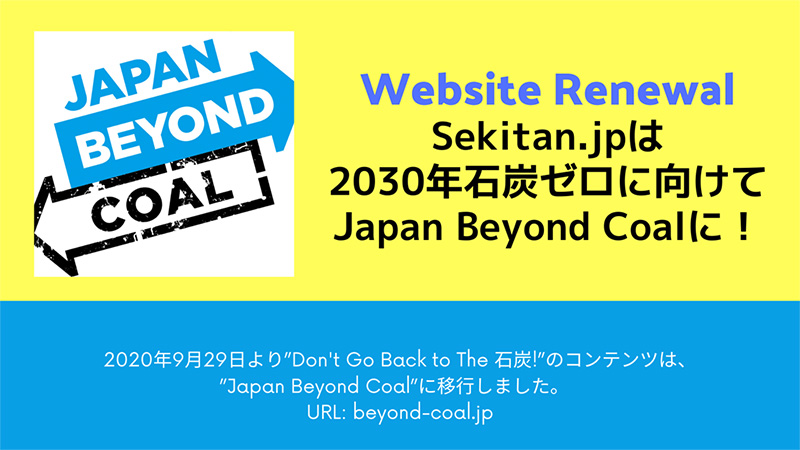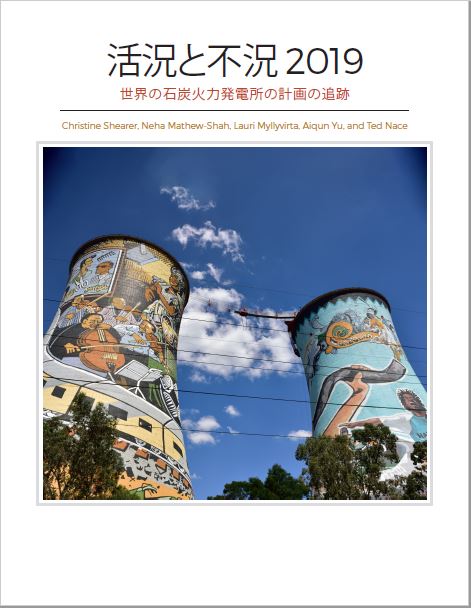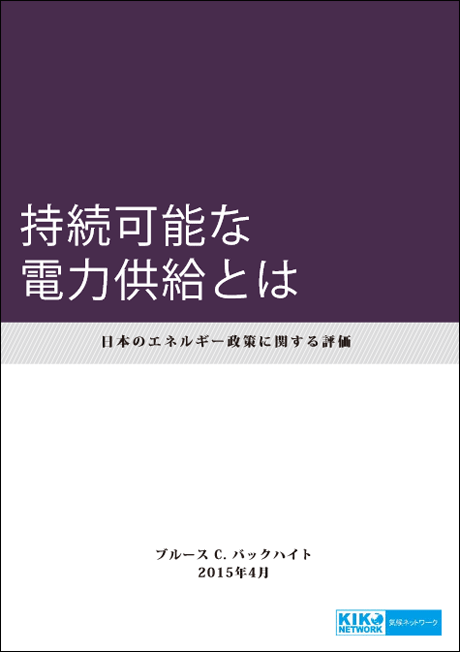[:ja]
レポート(報告書)など
日本語
報告書「活況と不況2019:世界の石炭火力発電所の計画の追跡(原題:Boom and Bust 2019: Tracking the Global Coal Plant Pipeline)」
「活況と不況2019:世界の石炭火力発電所の計画の追跡」(日本語PDF)
Boom and Bust 2019: Tracking the Global Coal Plant Pipeline(英語PDF)
「石炭火力2030フェーズアウトの道筋」提言レポート(2018年11月)
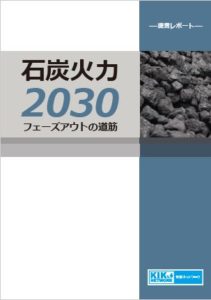
現在ある発電所の新設計画および建設工事を全て中止するとともに、既存の発電所を2030年までに全て廃止する必要があるという考えに基づいた提言レポートです。(PDF)
「パリ協定に基づく日本の石炭火力のフェーズアウト-政策決定者と投資家への示唆」(2018年5月)
この報告書は、欧州の政策研究所、クライメイト・アナリティクス(Climate Analytics)が作成した “Science based Coal-Phase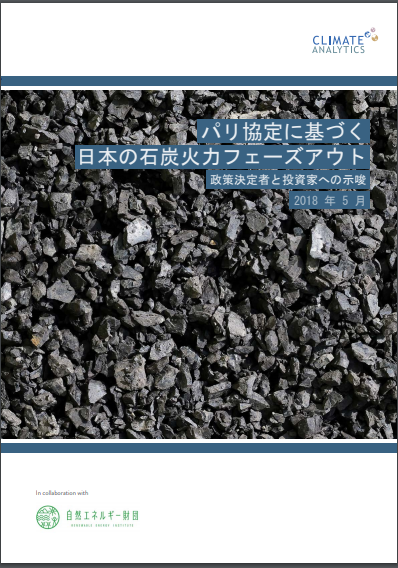 Out Timeline for Japan” を自然エネルギー財団が編集した日本語版です。
Out Timeline for Japan” を自然エネルギー財団が編集した日本語版です。
Climate Analyticsと自然エネルギー財団作成(日本語フルレポート)(概要版)
「活況と不況2018:世界の石炭火力発電所の計画の追跡(原題:Boom and Bust 2018: Tracking The Global Coal Plant Pipeline)」(2018年3月)
報告書「活況と不況2018:世界の石炭火力発電所の計画の追跡」(日本語)
Boom and Bust 2018: Tracking The Global Coal Plant Pipeline(英語)
日本における石炭火力新増設のビジネスリスク―設備利用率低下による事業性への影響―(2017年7月)
自然エネルギー財団が作成(日本語)
自然エネルギー財団 (報告書紹介ページへのリンク)
「G20の化石燃料政策における言動不一致:気候変動対策に逆行する巨額投融資の実態」(2017年7月)
(原題:Talk is Cheap: How G20 Governments are Financing Climate Disaster)」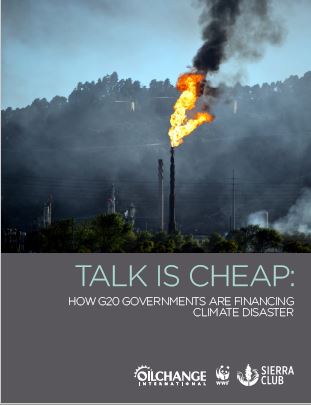
(日本語要旨PDF)(英語ダウンロードサイト)
「活況と不況2017ー世界の石炭科料発電所の計画の追跡」(2017年3月)
世界全体では建設前の48%、新設着工開始の62%の計画が中止になり、特に中国においては新規発電所建設許可の85%が保留となっ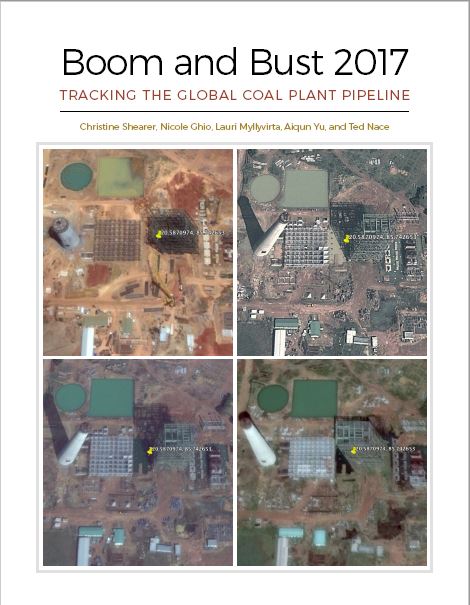 ていることが示されている。(日本語PDF)(英語:原題:Boom and Bust 2017: Tracking The Global Coal Plant Pipeline PDF)
ていることが示されている。(日本語PDF)(英語:原題:Boom and Bust 2017: Tracking The Global Coal Plant Pipeline PDF)
「日本:再エネを通じたエネルギー安全保障の拡大:ポスト原子力経済における電力の転換」(2017年3月)
2017年3月21日、米国の調査機関であるエネルギー経済・財務分析研究所(IEEFA)が、日本に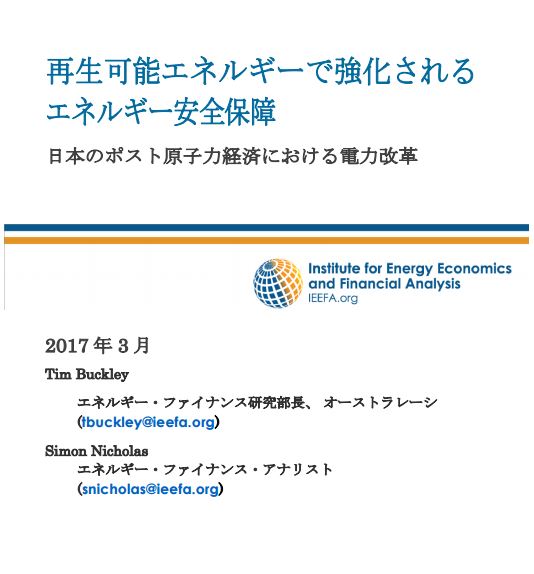 おけるポスト原子力経済を再生可能エネルギー経済にシフトさせていく方法を調査した報告書(原題:Japan: Greater Energy Security Through Renewables)を発表
おけるポスト原子力経済を再生可能エネルギー経済にシフトさせていく方法を調査した報告書(原題:Japan: Greater Energy Security Through Renewables)を発表
「日本:再エネを通じたエネルギー安全保障の拡大:ポスト原子力経済における電力の転換」(日本語)
Japan: Greater Energy Security Through Renewables(英語)
Institute for Energy Economics and Financial Analysis (IEEFA) Press Release (リンク)
アンチコールマンパンフレット(改訂版)石炭火力発電所の建設ラッシュで未来が危ういぞ!(2016年10月)
石炭火力発電の問題点についてわかりやすくまとめたアンチコールマンパンフレットを改訂しました。(PDF)
ご希望の方は気候ネットワーク東京事務所にご連絡ください(送料をご負担いただければ発送いたします)。
Oxford Smith School of Enterprise and the Environment (ssee) 報告書「日本における座礁資産と石炭火力 -環境関連リスク・エクスポージャーの分析」 (2016年5月)
オックスフォード大学スミス企業環境大学院の持続可能金融プログラムがまとめた報告書です。日本におおて石炭火力が座礁資産になる可能性と規模の検討を行った結果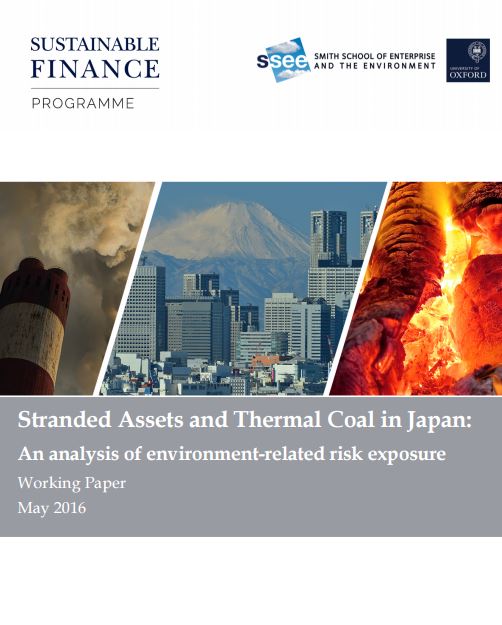 を記しています。(日本語版PDF)
を記しています。(日本語版PDF)
E3G報告書『G7石炭スコアカード更新版 石炭の段階的な削減と石炭火力発電所の閉鎖を目指して』(2016年5月)
英国のシンクタンクE3Gが、2015年10月に続き伊勢志摩G7サミットの開催に合わせてG7各国の石炭に関する政策を評価するスコアカードと報告書の更新版を発表したものです。
- 『G7石炭スコアカード更新版 石炭の段階的な削減と石炭火力発電所の閉鎖を目指して』スコアカード要約(PDF)
- 『勝算のない賭け 中国や米国が低炭素に向かう中、従来のビジネスに固執する日本』要約(PDF)
新規石炭火力発電所による大気環境および健康への影響 (2016年5月)
「新規石炭火力発電所による大気環境および健康への影響 〜東京・千葉エリアと大阪・兵庫エリアのケー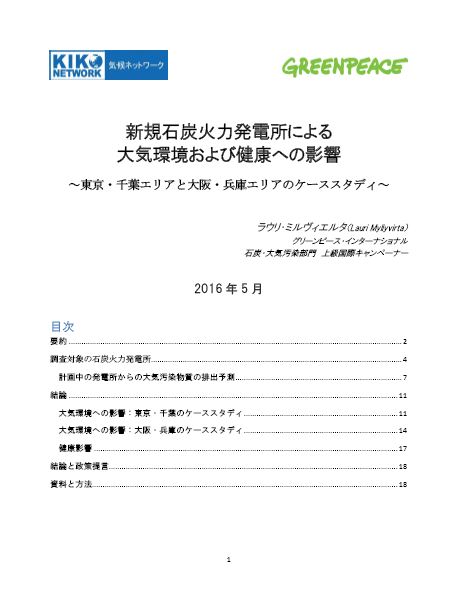 ススタディ〜」は、日本国内で建設が計画されている火力発電所からの汚染排出によって生じる可能性のある大気環境への影響を、大気汚染モデルシステムを使って調査した結果をまとめたものです。(和訳PDF)
ススタディ〜」は、日本国内で建設が計画されている火力発電所からの汚染排出によって生じる可能性のある大気環境への影響を、大気汚染モデルシステムを使って調査した結果をまとめたものです。(和訳PDF)
『高効率の石炭技術は2℃シナリオと矛盾』 (2016年4月)
『高効率の石炭技術は2℃シナリオと矛盾(原題:The Incompatibility of High-Efficient Coal Technology with 2 ºC Scenarios)』は、WWF EPO(ヨーロッパ政策オフィス)が、ECOFYSに委託して作成し、WWF Japanが和訳要約版を作成したものです。(和文要約PDF)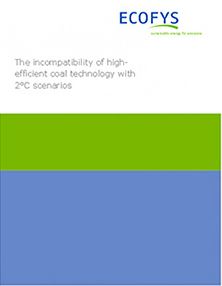
『活況と不況 2016 -世界の石炭火力発電所の計画と追跡-』(2016年4月)
世界の環境問題に取り組んでいる団体、シエラクラブ、コール・スワーム、グリーンピースが、「グローバル石炭発電所トラッカー」の2016年1月の調査結果を基に分析結果をまとめたものです。(PDF)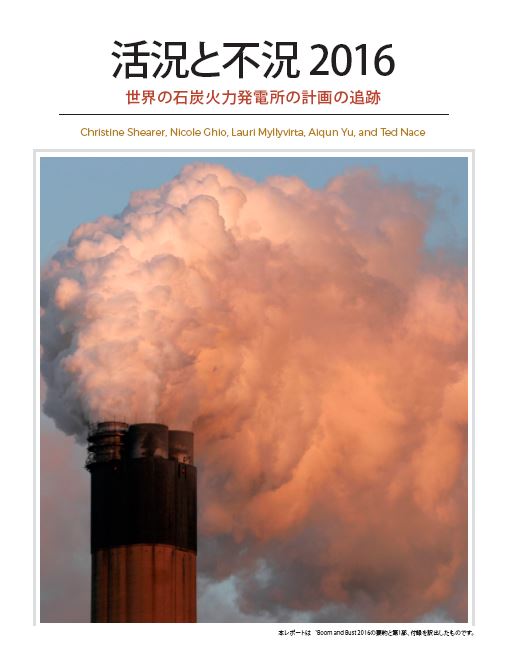
石炭はクリーンではない 検証:日本が支援する海外の石炭火力発電事業(2015年4月)
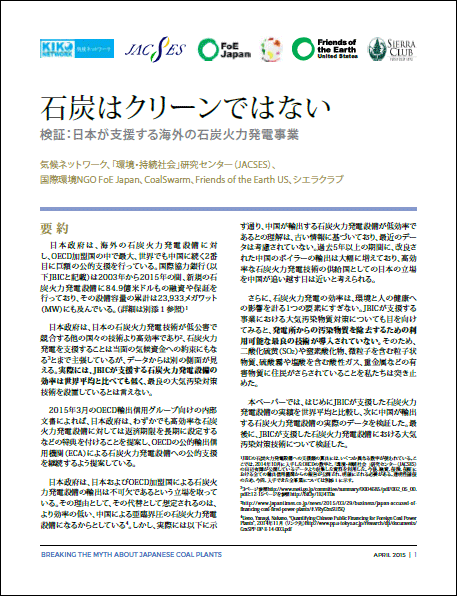
「石炭はクリーンではない 検証:日本が支援する海外の石炭火力発電事業」
日米の環境NGO(気候ネットワーク、「環境・持続社会」研究センター、国際環境NGO FoE Japan、CoalSwarm、Friend of the Earth US、シエラクラブ)による発表です。(PDF)
レポート「持続可能な電力供給とは~日本のエネルギー政策に関する評価~」(2015年4月)気候ネットワーク発表
米国の環境コンサルタント、ブルース・C・バックハイト氏に委託し、日本のエネルギーの選択肢や論点について、特に電力に焦点をあてて「エネルギー基本計画」や政策改定議論の中で十分に考慮されていない点も含めて評価を行ったものです。(PDF)
レポート「石炭火力発電所のデータ分析結果」(2015年4月)気候ネットワーク発表
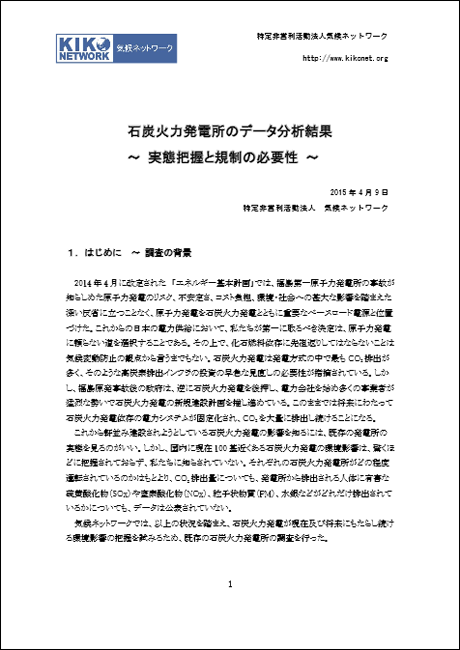 既存の石炭火力発電所に全68ユニットを対象に行ったユニット(一号機)あたりの排出実態調査の結果をまとめています。(PDF)
既存の石炭火力発電所に全68ユニットを対象に行ったユニット(一号機)あたりの排出実態調査の結果をまとめています。(PDF)
パンフレット「このままでは日本は石炭だらけに?」(2015年2月)気候ネットワーク作成(PDF)
気候ネットワーク・ニュースレター特別掲載(2013年3月号)
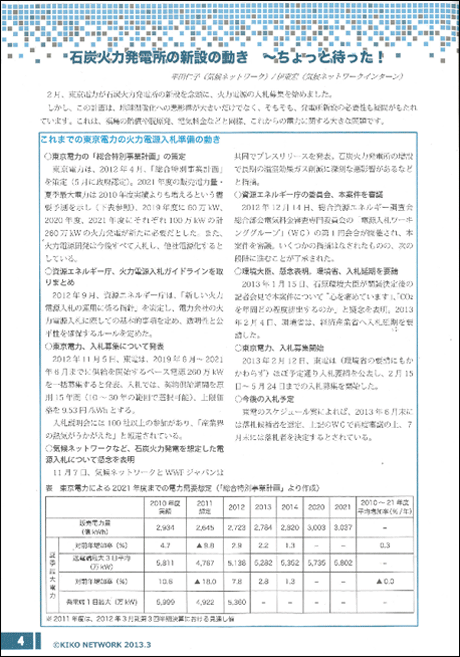 「石炭火力発電所の新設の動き ~ちょっと待った!」(PDF)
「石炭火力発電所の新設の動き ~ちょっと待った!」(PDF)
東電入札の石炭火力発電所の増設の問題の解説。
WWFジャパンのブリーフィングペーパー(2013年2月)
「石炭火力は入札すべきでない─東京電力の電力供給入札に関して」
東電入札の石炭火力発電所の増設の問題を解説しています。(PDF)
英語
E3G:G7 COAL SCORECARD – THIRD EDITION RHETORIC VS REALITY IN THE USA (2017年5月)
E3GによるG7各国の石炭に関する政策を評価するスコアカードと報告書 2017年版(PDF)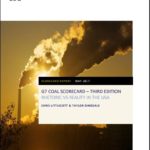
Climate Analyticsのレポート(2016年11月)
石炭火力発電を追い詰めるパリ協定 -Implications of Paris Agreement for coal use in the power sector –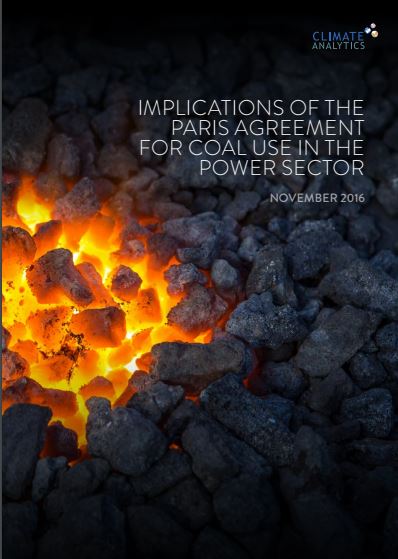
Implications of Paris Agreement for Coal Use in the Power Sectorのダウンロードサイトへのリンクはこちら
グリーンピースのレポート(2013年1月)
→ダウンロードサイトへのリンクはこちら
World Pesources Instituteのレポート(2012年11月)
“Global Coal Risk Assessment: Data Analysis and Market Research”
世界の石炭発電のリスクについて、データ分析・市場調査から評価。
→ダウンロードサイトへのリンクはこちら
シエラクラブのレポート(2012年9月)
“Move Beyond Coal, Now! Victories on the Front Lines”
インド、アメリカ、コソボ、ドイツ、オーストラリア、インドネシア、トルコ、マレーシアにおける石炭反対運動を紹介。(PDF)
動画
グリーンピース・オーストラリア太平洋による動画(2012年9月)
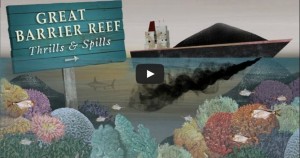
[:en]
Reports
Japan Coal Phase-Out: The Path to Phase-Out by 2030
Japan Coal Phase-Out: The Path to Phase-Out by 2030(PDF)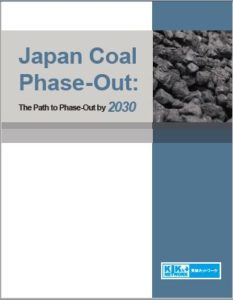
Science based coal phase-out timeline for Japan – Implications for policymakers and investors (May, 2018)
Japan’s current coal-fired power policies and plans would result in carbon pollution between now and 2050 almost 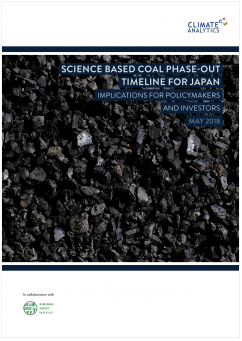 three times what is consistent with the Paris Agreement, risking stranded assets and loss of competitiveness for Japanese investors, says a new report by Climate Analytics, in collaboration with the Renewable Energy Institute of Japan.
three times what is consistent with the Paris Agreement, risking stranded assets and loss of competitiveness for Japanese investors, says a new report by Climate Analytics, in collaboration with the Renewable Energy Institute of Japan.
Full report (PDF), Executive Summary (PDF)
Boom and Bust 2018: Tracking The Global Coal Plant Pipeline(March, 2018)

Boom and Bust 2018: Tracking The Global Coal Plant Pipeline(PDF)
Business Risks of New Coal-fired Power Plant Projects in Japan(July, 2017 )
Business Risks of New Coal-fired Power Plant Projects in Japan(Report)
REPORT
Business Risks of New Coal-fired Power Plant Projects in Japan
—The Decline in Capacity Factor and Its Effect on the Business Feasibility(Link)
Talk is Cheap: How G20 Governments are Financing Climate Disaster (July, 2017)
download link
E3G Coal Scorecard update: G7 Scorecard and Briefing paper (May, 2016)
E3G updates their G7 coal Scorecard and briefing paper regarding Japanese coal policy. The first updated G7 coal scorecard since the Paris climate agreement shows further positive progress in coal investment trends. Japan however remains at odds with its G7 counterparts. (Link)
- Anainst the Odds – As China and the U.S. move low carbon, Japan bets on business as usual
- G7 Coal Scorecard Update – Coal phase out commitments and power plant closures
Boom and Bust 2017: Tracking The Global Coal Plant Pipeline (March, 2017)
Boom and Bust 2017: Tracking The Global Coal Plant Pipeline PDF
Japan: Greater Energy Security Through Renewables (March, 2017)
Japan: Greater Energy Security Through Renewables(PDF)
Institute for Energy Economics and Financial Analysis (IEEFA) Press Release (Link)
Air quality and health impacts of new coal-fired power plants in the Tokyo-Chiba and Osaka-Hyogo regions (May 2016)
Kiko Network and Greenpeace summarized case study of health impacts of new coal-fired power plants in the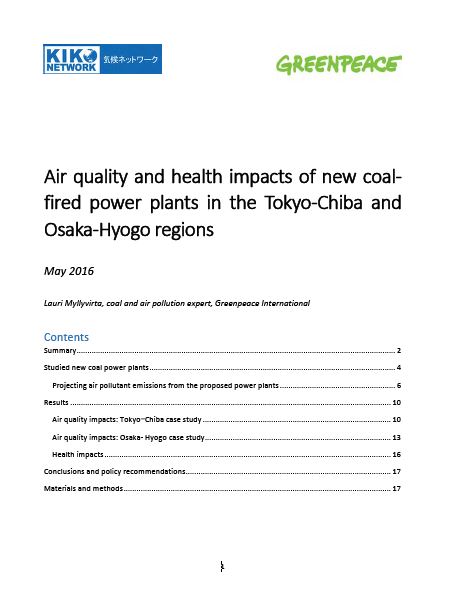 Japanese major towns. (PDF)
Japanese major towns. (PDF)
WWF: The Incompatibility of High-Efficient Coal Technology with 2 ºC Scenarios (WWF Japan, April 2016)
This report shows that HELE coal-fired electricity generation is incompatible with the goal to keep  temperature rise under 2°C. (PDF)
temperature rise under 2°C. (PDF)
Boom and Bust 2016 TRACKING THE GLOBAL COAL PLANT PIPELINE (April 2016)
This report, written by authors from Coalswarm, The Shierra Club, Greenpeace, provides the results of the 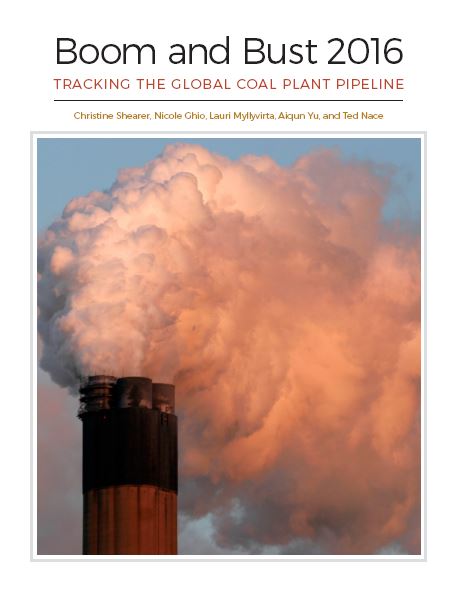
survey completed in January 2016 by the Global Coal Plant
Tracker. (Link)
Dirty Coal: Breaking the Myth About Japanese-Funded Coal Plants (April 2015)
This is the document that shows considerable increase of Japanese governmental finance support for coal 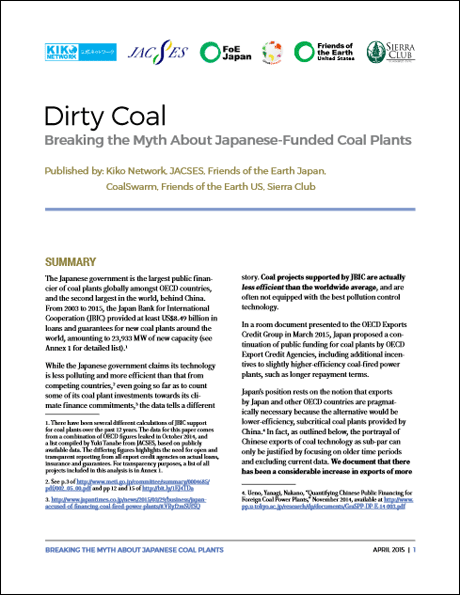 plants by JBIC.(PDF)
plants by JBIC.(PDF)
Japan’s Path to Sustainable Electricity Supply” (Kiko Network,April 2015)
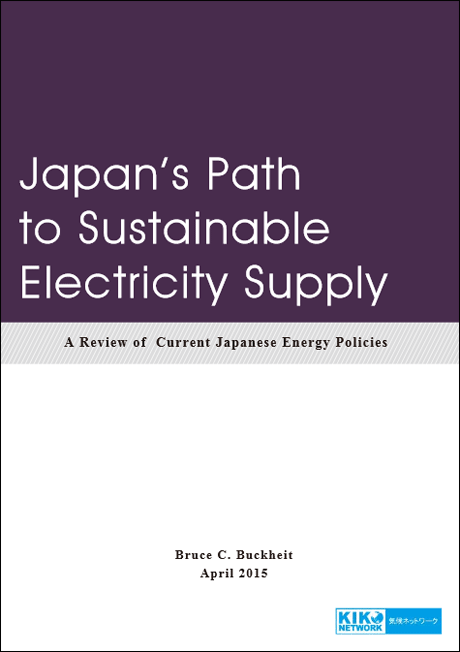
This report, commissioned to Bruce C. Buckheit, Energy and Environment Consultant, former USEPA official, reviews current Japanese energy policy and potential energy options and issues, focusing on electricity, that is not fully considered in Japan’s Strategic Energy Plan and potential policy revisions within Japan.(PDF)
Kiko Network Newsletter (Kiko Network,March 2013)
 “A movement to construct a new coal fired power plant ~Stop!~”
“A movement to construct a new coal fired power plant ~Stop!~”
The article illustrates the problem of TEPCO’s bid for a new coal fired power plant.(PDF)
WWF Japan’s Briefing Paper (WWF Japan,February 2013)
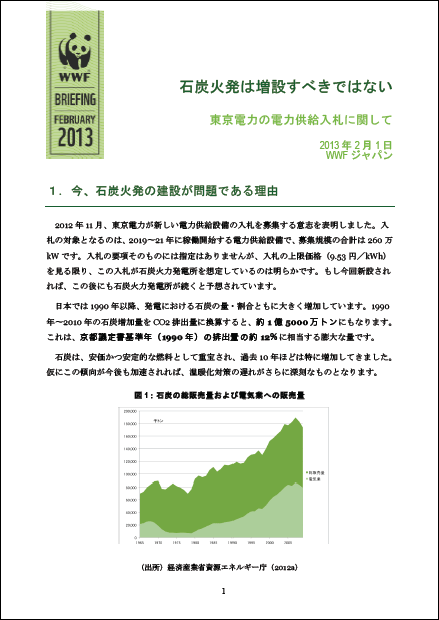
“TEPCO’s bid for a new power source will increase coal power use”
The article illustrates the problem of TEPCO’s bid for a new coal fired power plant.(PDF)
in English
A recent report by Greenpeace“Point of No Return”(January 2013)
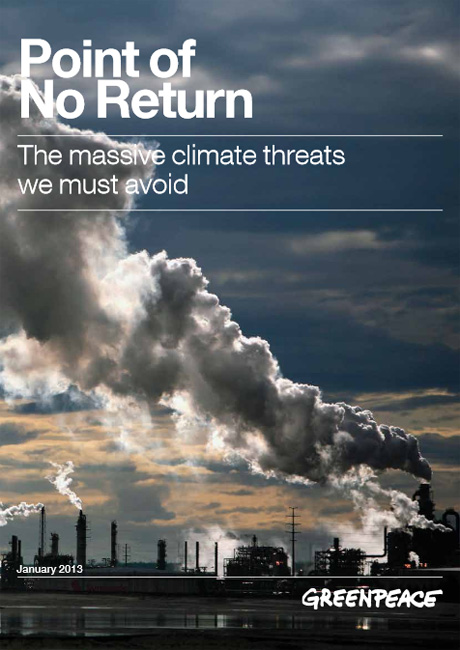
A report that focuses on worldwide coal power. (PDF)
World Resources Institute(October 2012)
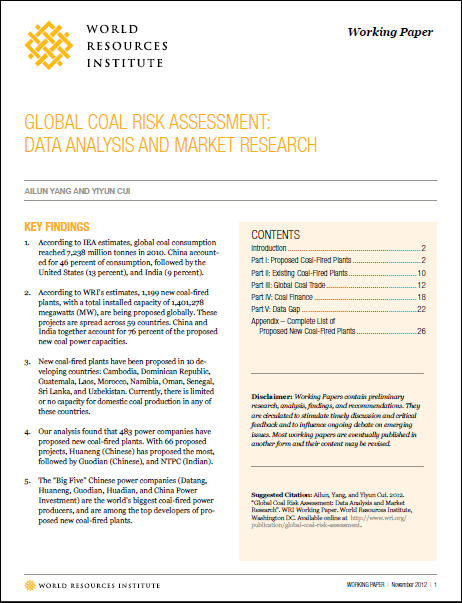
“Global Coal Risk Assessment: Data Analysis and Market Research”
Evaluating the risks of worldwide coal power through data analysis and market research.(LINK)
Sierra Club’s introduction of worldwide anti-coal movements(September 2012)
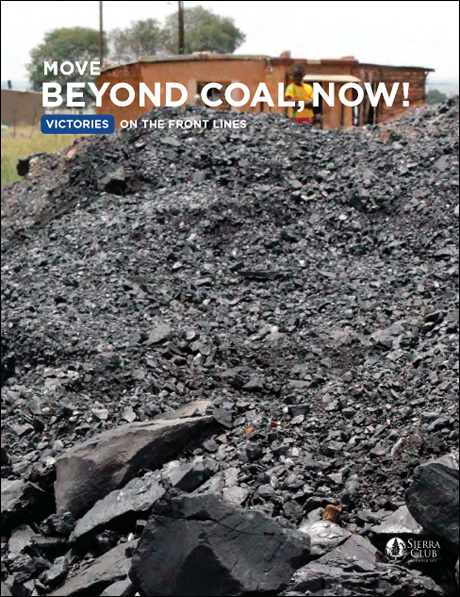
“Move Beyond Coal, Now! Victories on the Front Lines”
Demonstrates the successful examples of anti-coal campaigns in India, USA, Kosovo, Germany, Australia, Indonesia, Turkey, and Malaysia.(PDF)
videos
A video that reveals the reality of coal(September 2012)

Greenpeace Australia demands ships carrying coal across the Great Barrier Reef to stop using coal. (You Tube)[:]
